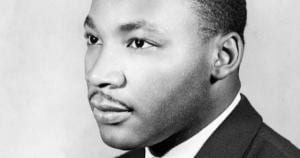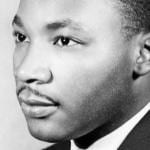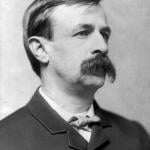 To the end of his life, Martin Luther King Jr. pressed for solutions to the problems of race, inequality, and poverty in the United States. He was willing to consider fairly radical proposals, though always in a basic American framework.
To the end of his life, Martin Luther King Jr. pressed for solutions to the problems of race, inequality, and poverty in the United States. He was willing to consider fairly radical proposals, though always in a basic American framework.
Martin Luther King and his father accepted the American dream, simply demanding that the promises America made be kept. The more one reads the younger King, the more the influence of Daddy King is evident. Martin Luther King Senior was a great man with fewer of the internal conflicts that plagued his son. If his son surpassed him in fame, this was by standing on the shoulders of this giant. In one sense, the father was a deeply conservative man as was his son to a lesser extent. Both rejected communism, both found nourishment in the Christian faith and in the promise of America.
Following his father, the son took as the “American dream” these words in the Declaration of Independence: “We hold these truths to be self-evident, that all men are created equal, that they are endowed by [their] Creator with certain inalienable Rights, that among these are Life, Liberty, and the pursuit of Happiness.”
This was a message grounded in a reality so vast, the work of the Creator that it applied to everyone, even agnostics:
The first saying we notice in this dream is an amazing universalism. It doesn’t say “some men,” it says “all men.” It doesn’t say “all white men,” it says “all men,” which includes black men. It does not say “all Gentiles,” it says “all men,” which includes Jews. It doesn’t say “all Protestants,” it says “all men,” which includes Catholics. (Yes, sir) It doesn’t even say “all theists and believers,” it says “all men,” which includes humanists and agnostics.
King is not the first to point out that the American dream frequently was preached and often ignored. We are a nation of hypocrites:proclaiming rights to all, grounded in God, but promoting legalized abortion, thievery of First Nation lands, crimes like the Trail of Tears, race based slavery, Jim Crow, Know Nothing discrimination against Catholics, the Chinese exclusion acts. We said rights came from the Creator, but we denied God’s children those basic rights to life, liberty, and the pursuit of happiness.
The list is endless.
King accepted a natural aristocracy of merit. He knew not every human has the mind of Plato, the musical genius of Bach, or the scientific brilliance of Einstein. Instead, “What it does mean is that all men are equal in intrinsic worth.” King saw this American idea springing from the Bible and Christianity: the image of God in every person. We forget how explosive this idea was. Every human, even our enemies, even the apostate, is created in the image of God and so has inalienable rights. Segregation, legal or social, denies the full humanity of other people as surely as does any caste system. Segregation is immoral.
King sees that a class system can equally deny full human rights to the “outsiders.” He says of the evil of denying full humanity to other people: “Now, that doesn’t only apply on the race issue, it applies on the class question. You know, sometimes a class system can be as vicious and evil as a system based on racial injustice.”
In my small way, I saw this when an upstate New York school described my West Virginia childhood as “culturally deprived.” I see it when the “illiterate” are considered stupid or somehow sub-human on social media. I see it when the poor are deprived of basic human rights just because they are poor. I saw it in a friend who as a child in the secular New York State welfare system was given a lobotomy just because he was black and poor.
This hideous snobbery can come when a person feels “educated” and compares himself to the “uneducated.” Reverend Doctor King makes in plain:
I remember when I was in theological school, and we were coming to the end of our years there, a classmate—he came to me to talk with me—said that he wanted to invite his mother up. And she’d struggled in order to help him get through school. He wanted to invite his mother up, but he said, “You know, the problem is I don’t know if she would quite fit in this atmosphere. You know, her verbs aren’t quite right; and she doesn’t know how to dress too well; she lives in a rural area.” And I wanted to say to him so bad that you aren’t fit to finish this school. (Yes) If you cannot acknowledge your mother, if you cannot acknowledge your brothers and sisters, even if they have not risen to the heights of educational attainment, then you aren’t fit (Have mercy) to go out and try to preach to men and women. (Amen)
The snobbery that makes a credentialed person more of a person than those lacking credentials is a betrayal of the American dream and a stench in the Almighty’s nostrils. Schooling is a great gift and the skills gained should not be ignored, but being skilled grants no special human rights. King is right: “Sometimes Aunt Jane on her knees can get more truth than the philosopher on his tiptoes.”
I have seen this myself.
We begin, King argues, by eliminating the idea of “menial” work. Following the mainstream of Christian thought, King elevates all honest toil and then points out that if we value such work we should pay decent wages:**
This is why we must join the war against poverty (Yes, sir) and believe in the dignity of all work. What makes a job menial? I’m tired of this stuff about menial labor. What makes it menial is that we don’t pay folk anything. (Yes, sir) Give somebody a job and pay them some money so they can live and educate their children and buy a home and have the basic necessities of life. And no matter what the job is, it takes on dignity.**
Amen.
King is right to say that we must not just affirm this, but do something where the dream is failing. If we have different solutions, we must apply the solutions we prefer and not simply ignore the problem because we do not like one set of solutions. When children go to bad schools, perhaps we need an urban school of the highest quality where nobody is turned away for inability to pay. When college debt shackles so many, maybe we need a private college program where work study can pay the full tuition amount.
Let us do something to make the dream a reality for all we can. Let us be intolerant of anyone and any movement that would deny humanity to any of God’s children.
The key, as King preaches, is love and never hate. In this way, the dream can become reality and the hypocrisy fade away. Lord Jesus Christ, son of God, have mercy on me a sinner.
—————————————————-
I have written about Rev. Dr. King (and his father!) several times. (Hopefully many of the obvious questions you might ask me regarding my opinions on Rev. Dr. King will be answered in the links.
As always with great books and leaders, especially on authors or topics on which I lack training, I begin as a student. First, I learn. Second, I apply what is true. Third, I consider what seems wrong. Fourth, I assume I am wrong for a goodly bit. Fifth, if I still think I am right, I express my ideas to a community to see!
*King Sr.was a moderate Democrat, especially by today’s standards. He helped Jimmy Carter secure the nomination for President in 1976 against more “liberal” opponents. He trusted Carter on Civil Rights. This trust was rewarded.
**We can argue about the best way to achieve this. I tend to private solutions with some government equalization (Theodore Roosevelt), while King supported much stronger government intervention. The point is that all Christians agree on the dignity of all honest toil and the necessity of an honest paycheck for an honest days work. The agreement matters. Conservatives, progressives, socialists, and more free market types must present how justice can best be achieved.











